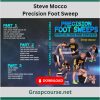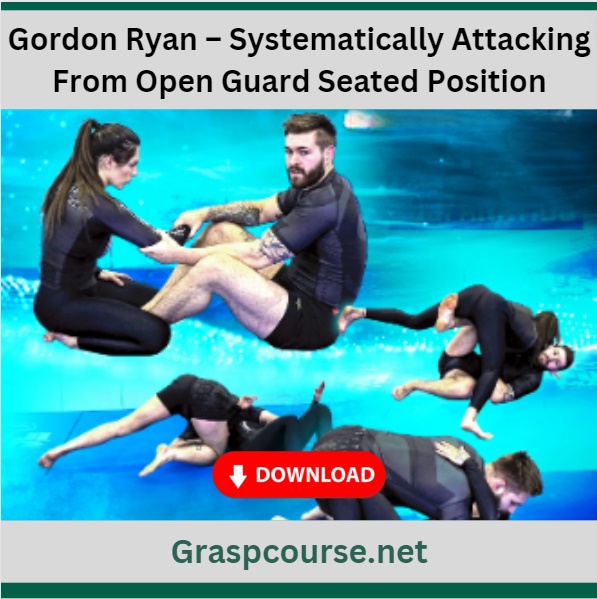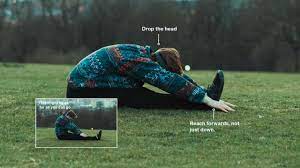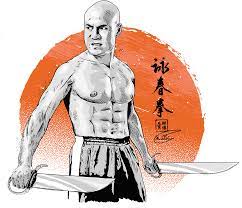Gordon Ryan – Systematically Attacking From Open Guard Seated Position
$249.00 Original price was: $249.00.$70.30Current price is: $70.30.
Gordon Ryan Systematically Attacking From Open Guard Seated Position Course [Download]
1️⃣. What is Systematically Attacking From Open Guard Seated Position:
This course teaches you how to excel in the seated open guard position in no-gi grappling. It is led by Gordon Ryan, a renowned expert in jiu-jitsu.
The training focuses on techniques that enhance your control and attacking skills from the seated open guard. You will learn how to respond effectively to any movement your opponent makes.
Gordon Ryan’s approach is structured and strategic, making it easier to understand and apply the techniques in real matches. This course is ideal for improving your defensive and offensive skills in grappling.
📚 PROOF OF COURSE


2️⃣. What you will learn in Systematically Attacking From Open Guard Seated Position:
In Systematically Attacking From Open Guard Seated Position course, you will acquire a deep understanding of how to dominate your opponent from the seated open guard. Here’s what you’ll learn:
- Master Position Control: Learn to maintain crucial body positions that give you an upper hand in grappling.
- Signature Moves: Get detailed instructions on Gordon Ryan’s own techniques like the shoulder crunch and double kouchi gari.
- Setting Goals: Develop clear strategies for your guard game that help you anticipate and counter opponent’s moves effectively.
- Technique Breakdowns: Watch Gordon Ryan analyze sparring sessions to understand how techniques are applied in live scenarios.
- Advanced Skills: Explore complex movements and sequences that are key to succeeding at high-level grappling competitions.
This training is designed to enhance both your knowledge and practical skills, ensuring you leave with a comprehensive understanding of effective grappling strategies.
3️⃣. Systematically Attacking From Open Guard Seated Position Course Curriculum:
Part 1:
- Intro
- Intro to open guard
- 4 main body positions
- Goal setting
- Distance management
- The importance of concave shoulders
- Drill to help reinforce the idea of concave shoulders
- Basic ashi garami entrance versus square stance
- Single kouchi into ashi versus square stance
- Double kouchi no grips
- Double kouchi using collar tie
- Understanding the importance of 2 on 1 gripping and arm dragging
- Basic ashi garami entrances via 2 on 1
- Double kouchi when opponent pulls back
- Failed double kouchi shin to shin entrance
- Shin to shin kouchi/ashi entrance
- Mechanics of entering ashi from shin to shin
Part 2:
- Introduction to te waza (hand technique) versus square stance
- Kibisu gaeshi (ankle pick) series
- Combining te waza ashi waza and ashi garami
- 2 on 1s to kibisu gaeshi
- Reverse imanari roll
- Imanari roll
- Introduction to staggered stance
- Grip fighting versus stagnant opponent staggered stance
- Grip fighting the near hand to attain far arm
- Forcing square stance double kouchi
- Accessing far leg ashi garami/x guard entrances
- Introducing de ashi harai
- De ashi harai sweep
- De ashi back take
- Failed de ashi double kouchi followup
- Entering shin to shin from distance
Part 3:
- Introduction to a kneeling opponent
- Goal setting
- Distance (Control)
- Push pull relationship
- Reiterating the upper body and lower body relationship
- Classification of sweeps
- The four quadrants
- The need for multi-directional sumi gaeshis
- Forward shifting
- Forehead to the mat rule
- The sad truth
- The importance of sticky hooks
- Basic elevation drills
- Elevation to a irimi ashi garami
- Elevation into cross ashi garami
- Basic kuzushis
- Grip fighting strategies
Part 4:
- 2 on 1 elbow basic sweep
- 2 on 1 elbow planted foot
- 2 on 1 hiza guruma
- 2 on 1 elbow back take
- 2 on 1 elbow switch to over under
- 2 on 1 elbow enter the legs
- Repeat series with arm drag
- Performing a proper under over sweep
- Under over hiza guruma
- Forward shift to counter a post hand
- Failed under over enter the legs
- Under over switch to kata gatame
- Back take from kata gatame
- The kata gatame trilemma
- Forward shifting with kata gatame
Part 5:
- Failed under over witch to pinch headlock
- Transitioning from pinch headlock to katagatame
- Sweeping from pinch headlock
- Multi-directional sweeps from pinch headlock
- Switching from pinch headlock to shoulder crunch
- Sweeping from shoulder crunch
- Multi-directional shoulder crunch sumi gaeshi
- Failed shoulder crunch/pinch headlock enter the legs
- Shoulder crunch forward shift into sankaku (triangle)
- Taking a look at some combinations
- Understanding the roll that double unders play
- Sweeping from double unders
- Explanations behind countering the body lock pass
- Countering the body lock with a double overhook sumi gaeshi
- Countering body locks with multi-directional sumi gaeshis
- Failed double over sumi gaeshi – enter the legs
- Forward shifting from a successful body lock
- Baiting an underhook
- Switching sides and combinations
- The roles that collar ties play
- Collar tie to guillotine
- Guillotine combinations
- Introduction to yoko sumi gaeshi
- Yoko sumi gaeshi combinations
- Yoko sumi gaeshi combinations 2
Part 6:
- Changing gears
- Partner collar ties – enter sankaku (triangle)
- Partner collar ties – enter juji gatame (arm bar)
- Failed juji/sankaku – enter the legs
- Countering head and shoulder posts
- 2 on 1 elbow to triangle
- Triangle fails switch to arm drag
- Arm dragging to the back
- Arm dragging to the back 2
- Arm dragging to the back 3
- How to properly enter the legs when opponent steps a leg up
- Using arm drags and 2 on 1s to force opponent to step a leg up
- Additional yoko sumi gaeshis when opponent steps a leg up
- Touching on the nogi berimbolos
- Push/pull combinations
- Touching on guard retention
- Breaking the rules
- Outro
- Outtakes
Part 7 Rolling:
- Placido
- Jack
- Drew
- Alex
- Shawn
Part 8 Rolling Commentary:
- Placido
- Jack
- Drew
- Alex
- Shawn
Systematically Attacking From Open Guard Seated Position Course provides a detailed exploration of mastering the seated open guard through a systematic approach. It begins with the basics of open guard, emphasizing goal setting and effective distance management.
As you progress, the curriculum introduces complex techniques like ashi garami and sumi gaeshi. You will also learn strategic grip fighting to enhance your competitive edge.
Practical drills and rolling sessions are integral to the course, helping reinforce the techniques learned. These ensure you can apply what you’ve learned effectively in competitive settings.
The course covers countering strategies and multi-directional movements, crucial for high-level grappling. This comprehensive approach prepares you for various grappling scenarios.
4️⃣. Who is Gordon Ryan?

Gordon Ryan is a prominent figure in the world of no-gi grappling, hailing from Monroe, New Jersey. Born in 1995, he began his jiu-jitsu journey at the age of 15 and quickly ascended the ranks under the guidance of influential coaches like Garry Tonon and John Danaher.
Ryan made a name for himself by dominating major competitions, including winning the ADCC World Championships multiple times. Known for his strategic approach and innovative techniques, Gordon has significantly influenced modern grappling styles.
Aside from his competitive success, Gordon is passionate about teaching and has helped countless students improve their skills through his detailed and methodical instruction style. His courses are celebrated for their clarity, depth, and practical applicability.
5️⃣. Who should take this course?
Systematically Attacking From Open Guard Seated Position Course is designed for a variety of learners interested in improving their grappling skills:
- Beginners in Jiu-Jitsu: If you’re new to grappling and looking to build a solid foundation in open guard techniques, this course will guide you through the basics and beyond.
- Advanced Practitioners: Experienced grapplers can refine and expand their skills, especially in no-gi scenarios, with advanced techniques and strategies.
- Competitive Fighters: Athletes preparing for competitions will find these techniques particularly useful for gaining an edge in no-gi tournaments.
- Martial Arts Instructors: Coaches and instructors can enhance their teaching toolkit with innovative approaches and detailed technical breakdowns.
Systematically Attacking From Open Guard Seated Position Course offers valuable insights and techniques that are beneficial for anyone serious about enhancing their grappling skills and understanding of the sport.
6️⃣. Frequently Asked Questions:
Q1: What is no-gi grappling?
No-gi grappling is a form of jiu-jitsu practiced without the traditional kimono (gi). Competitors wear athletic gear like rash guards and shorts, focusing more on grips on the body rather than clothing.
Q2: Can you do jiu-jitsu without a gi?
Yes, you can practice jiu-jitsu without a gi, known as no-gi jiu-jitsu. It emphasizes speed and agility, and you’ll learn grips and holds that don’t rely on clothing.
Q3: Why is no-gi so popular?
No-gi grappling has gained popularity due to its fast pace and its application in mixed martial arts (MMA). It appeals to those interested in a more dynamic and realistic form of combat training.
Q4: Can you get a belt in no-gi?
Traditionally, no-gi jiu-jitsu does not involve a belt system. However, some schools may use rash guards or shorts with colors to signify levels, similar to belts in gi jiu-jitsu.
Q5: Should you start BJJ with a gi or no-gi?
Starting with a gi can help you understand the fundamentals and mechanics of jiu-jitsu deeply. However, starting with no-gi can be ideal if you prefer a faster-paced style or plan to compete in MMA.
Be the first to review “Gordon Ryan – Systematically Attacking From Open Guard Seated Position” Cancel reply
Related products
Personal Development
Personal Development
Personal Development
Personal Development
Personal Development
Personal Development
Personal Development
Personal Development












Reviews
There are no reviews yet.